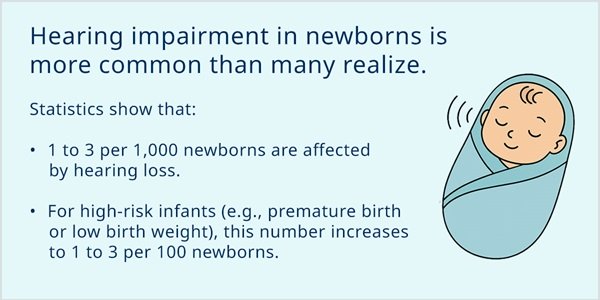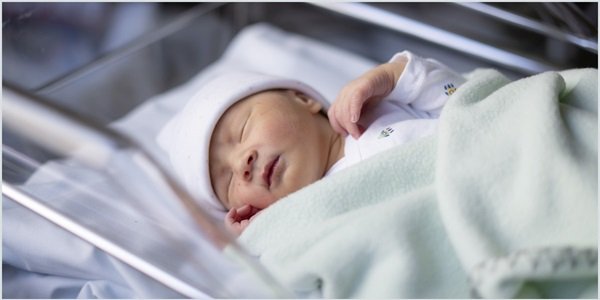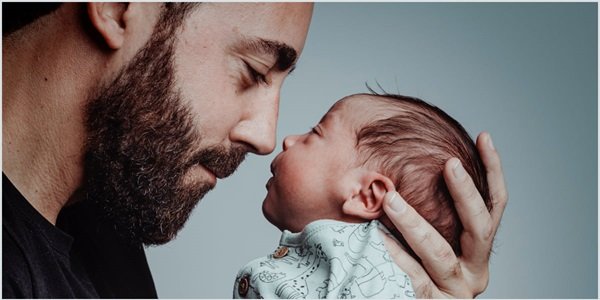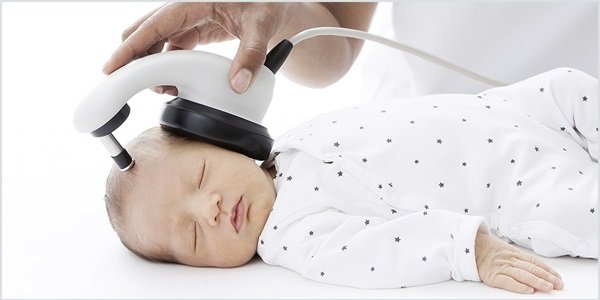The Importance of Early Hearing Detection
The importance of hearing is often overlooked. But our ability to hear enables us to engage in conversations and communicate with others, forming the foundation of learning. When hearing is impaired, whether due to hearing loss or complete deafness, our cognitive development can be affected. That’s why hearing is particularly crucial in the early stages of life, as it is through this sense that we develop our learning and language skills. But how can we ensure that a newborn’s hearing functions properly? This is where newborn hearing screening comes into play!
Why Is Newborn Hearing Screening So Important?

It is not surprising that hearing impairment can occur at birth. Did you know that a child begins to hear already in the womb, specifically from the 19th week of pregnancy? At this stage, the child begins to process and recognize sounds it hears and perceives in the womb. And shortly after birth, the newborn is already able to distinguish between male and female voices, as well as the mother’s voice from other female voices. This is also when the development of the auditory pathway begins, which is the connection from the ear to the brain – but only if the child can actually perceive the acoustic stimuli.

The development of the auditory pathway depends on exposure to sound. If a potential hearing impairment is not detected and treated at this stage, the auditory pathway will not develop properly and may even deteriorate. These delays in development cannot be completely made up for and a high effort is needed to achieve a small improvement in speech communication. That is why early detection of hearing impairment with newborn hearing screening is so important.
Newborn Hearing Screening Provides Healthy Development for the Child!
Moreover, a newborn’s sense of hearing is a crucial component of language development. Untreated hearing loss can lead to:
- Delayed speech and language skills.
- Lower academic performance.
- Social isolation and low self-esteem in later life.

Hearing loss is also a significantly underestimated economic risk. The economic impact includes not only direct costs, such as doctor visits, recurring hearing tests, and cochlea implants, but also indirect costs. Individuals with untreated hearing may face challenges in employment, including a higher likelihood of unemployment or working in roles below their potential. According to the 2021 World Hearing Report by the WHO, the annual cost to governments amounts to approximately 980 billion US dollars.

The earlier hearing loss is diagnosed, the higher the success of therapy: Children should become accustomed to treatment as early as possible, for example with hearing aids or a cochlea implant, to support communication with their surroundings. Therefore, hearing impairment in newborns should be detected and treated as early as possible. MAICO, as one of the world’s leading providers of newborn hearing screening solutions, has been supporting clinics and doctors for almost 90 years and can therefore rely on extensive expertise in hearing care industry.
How Newborn Hearing Screening Works
As mentioned, newborn hearing screening is ideally done within the first three days of life, usually in the birth clinic or community health care centers. This examination is normally fully covered by health insurance – if the country has an official newborn hearing screening program in place.
There are two primary hearing screening methods used for newborns:
1. Otoacoustic Emissions (OAE) Test
It is performed to assess the function of hair cells in the inner ear. When sound waves hit the ear, hair cells in the inner ear, or cochlea, begin to vibrate. The sounds which are produced in this process are called otoacoustic emissions (OAEs). Using the ERO•SCAN device from MAICO, a small probe is placed in the ear canal, which emits sounds and measures the echo that is returned from the inner ear. If the hair cells produce an echo, normal hearing is indicated. If there is no echo, further tests are needed.

2. Auditory Brainstem Response (ABR) Test
This test is conducted to measure nerve activity from the auditory nerve to the brainstem. For example, with the MB 11 BERAphone®, electrodes are attached to the scalp, and the device emits sounds through a speaker to measure the brain’s response, providing immediate results. Since both tests are easy-to-use, painless, and do not require an active response from the infant, they are ideal for newborn hearing screening.

In summary, hearing is a fundamental sense that plays a vital role in communication, learning, and cognitive development, particularly in the early stages of life. Early detection is crucial for effective therapy and healthy development of newborns. By prioritizing newborn hearing screenings, we can help every child live a successful and happy life, fostering healthy development and effective social skills.
Key Takeaways
✔ Hearing is essential for communication, learning, and cognitive development—especially in the early years.
✔ 1 to 3 out of every 1,000 newborns are born with hearing impairment.
✔ Untreated hearing loss can impact speech, education, social skills, economic opportunities and the overall quality of life.
✔ Early detection through newborn hearing screening is crucial for effective therapy and healthy development.
✔ MAICO is a global leader in newborn hearing screening, providing OAE and ABR solutions for hospitals, doctors, and audiologists worldwide.